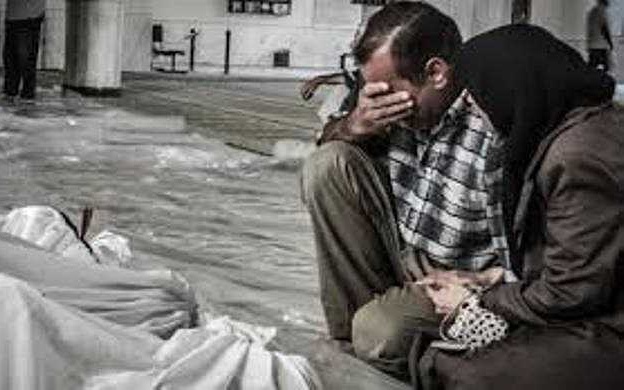A couple mourn a victim of the Assad regime’s sarin attacks near Damascus, August 21, 2013
The Organization for the Prohibition of Chemical Weapons has recommended a ban on chemical transfers to Syria because of the Assad regime’s sarin and chlorine attacks, as well as its ongoing refusal to submit a complete declaration of its chemical stocks and facilities.
The 28th conference of the State Parties to the Chemical Weapons Convention adopted a resolution, tabled by 48 countries, “Addressing the Threat from Chemical Weapons Use and the Threat of Future Use”.
The Conference found that the Assad regime’s continued possession and use of chemical weapons is compounded by the failure to submit an accurate and complete declaration and to destroy all undeclared chemical weapons and production facilities. It said this has “caused serious damage to the object and purpose of the Chemical Weapons Convention”.
The member states recommended collective measures, in accordance with national laws, to prevent the direct or indirect transfer to Syria of chemical precursors, dual-use chemical manufacturing facilities and equipment, and related technology.
They also requested that all states provide support and assistance to criminal investigations or proceedings pursuing accountability, including the UN-established International, Impartial, and Independent Mechanism.
The Assad regime’s Foreign Ministry, ignoring the majority, fumed on Sunday that the conference resolution “represents only the isolationist positions of Western countries and not others”.
From 2013 to 2018, the regime carried out more than 300 chemical attacks as it tried to break mass opposition to its rule. They included sarin attacks on multiple sites near Damascus in August 2013, killing more than 1,400 civilians; a sarin assault on Khan Sheikhoun in northwest Syria in April 2017, killing about 90 people and wounding hundreds; and a chlorine attack on Douma near Damascus in April 2018, slaying 43 civilians as they tried to flee a residential building.
For years Russia and the regime, supported by pro-Kremlin activists, pushed disinformation and falsehoods to undermine the OPCW and block any finding of responsibility. However, the organization’s experts persisted, and the regime was formally blamed for some of the attacks, including the strikes on Khan Sheikhoun and Douma.
See also How UN Concluded Assad Regime Carried Out Sarin Attack on Khan Sheikhoun
Denying Syria’s Chemical Attacks, Attacking the Inspectors — The Douma Case


[Editor’s Note: The post is ignorant about both Fact Finding Mission and final reports on Douma which documented in detail how chlorine — in an unusual concentration because it funneled down the residential building from the roof to the lower floors — killed 43 people.
https://www.opcw.org/media-centre/news/2023/01/opcw-releases-third-report-investigation-and-identification-team
All reports can be found here.]
“From 2013 to 2018, the regime carried out more than 300 chemical attacks as it tried to break mass opposition to its rule. They included sarin attacks on multiple sites near Damascus in August 2013, killing more than 1,400 civilians; a sarin assault on Khan Sheikhoun in northwest Syria in April 2017, killing about 90 people and wounding hundreds; and a chlorine attack on Douma near Damascus in April 2018, slaying 43 civilians as they tried to flee a residential building.”
The OPCW never explained how chlorine gas – released from canisters exposed to the open air on an upper floor – managed to sink down to lower floors and kill 43 people who would have been able to smell the gas and move elsewhere for safety. Chlorine is used to kill microbes and lice but not humans. It is found in bleach and tap water. Most people do not die from exposure to the gas but do suffer injuries: https://www.scientificamerican.com/article/chlorine-accidents-take-big-human-toll/